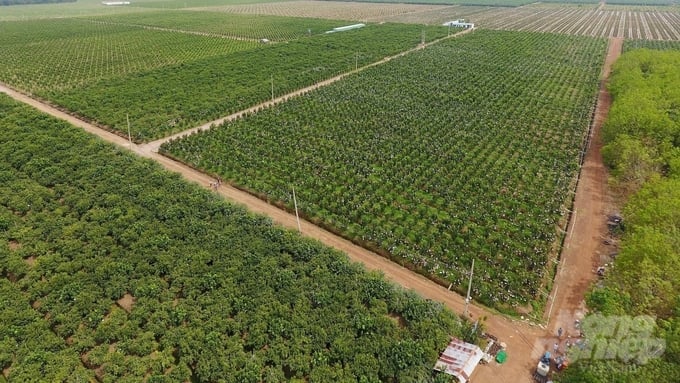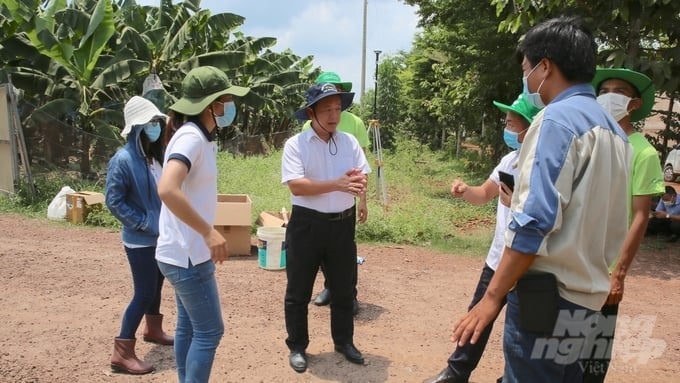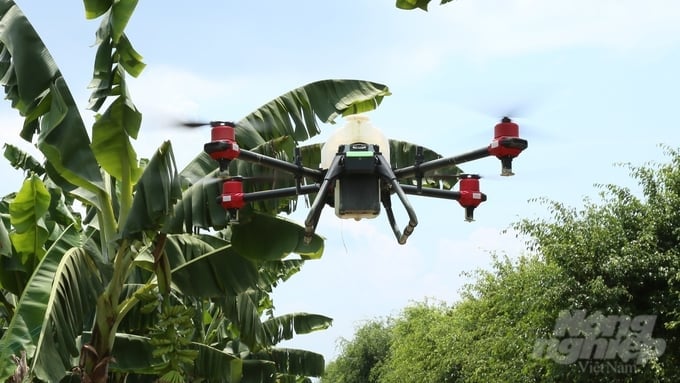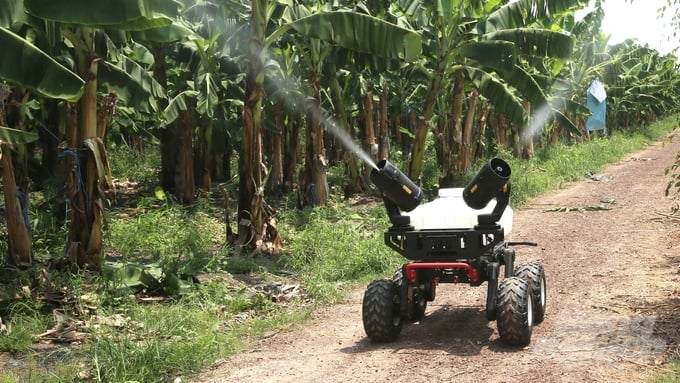May 20, 2025 | 17:20 GMT +7
May 20, 2025 | 17:20 GMT +7
Hotline: 0913.378.918
May 20, 2025 | 17:20 GMT +7
Hotline: 0913.378.918
Over a decade ago, high-tech agriculture was still relatively new, but An Thai High-Tech Agriculture Joint Stock Company (Unifarm) emerged as a pioneer, investing in advanced agricultural models in Binh Duong.

Unifarm has been at the forefront of developing and applying high technology in agriculture. Photo: Hong Thuy.
Today, high-tech agricultural models are increasingly prevalent nationwide, with many enterprises establishing their stature and presence in global markets. Unifarm, in particular, has distinguished itself as a “giant” in the agricultural industry.
Unifarm started from humble beginnings: with no capital, no land, and only a handful of inexperienced employees. As a result, Mr. Pham Quoc Liem, Director and Chairman of Unifarm, prioritized the human element to create quality products to meet the standards of demanding markets such as Japan, Korea, Singapore, and later expanded to the U.S. and Europe. He emphasized that investment in science and technology is the key.
After 12 years, Unifarm has grown significantly, employing more than 400 staff members and becoming a recognized name in supermarket chains. The stability and growth of its customer base have fueled the company’s continued investment, product diversification, and market expansion.
Reflecting on the journey to mastering high-tech agriculture, Mr. Liem noted that agriculture has its unique challenges, unlike industrial production, as it depends on numerous factors like soil, climate, and skills. To ensure proper investment, Unifarm has conducted experiments on cultivating melons and 20 other types of fruits and vegetables, covering areas ranging from 1 to 5 hectares each, including bananas. After three years of testing, the company has identified key crops that meet both production conditions and market demand.

After 13 years of establishment, Unifarm has grown strongly, with more than 400 workers, experts, and engineers. Photo: Hong Thuy.
Unifarm became the first unit in the country to grow melons in a 1-hectare greenhouse, controlled by computers with technology imported from Israel. Remarkably, their produce met GlobalGAP standards from the first harvest in September 2010. Unifarm’s melons quickly gained popularity, being sold in major supermarkets nationwide and later exported to several Asian countries, sparking a wave of melon cultivation across various localities. In 2013, Unifarm expanded its success with 10 hectares of Philippine bananas, yielding an average of 50 tons per hectare. These bananas, meeting GlobalGAP standards, were exported to Korea, Japan, the U.S., and other markets, marking Unifarm’s initial triumphs.
By 2016, Unifarm’s banana products had earned the prestigious right to use the Dole label, granted by Dole, the world’s leading banana corporation, in markets across Vietnam, Japan, Korea, and Malaysia. Additionally, Unifarm has transferred its technology to many of Vietnam’s leading banana farms, which now operate on a scale of thousands of hectares.
"The two crops we developed in Vietnam – melons and bananas – have continued to thrive, generating substantial income for over a decade. Reflecting on Unifarm's journey, I believe my colleagues and I have done well, growing step by step, from small-scale tests to larger-scale production for ourselves and expanding to affiliated units," shared Mr. Pham Quoc Liem.
The fruits of Unifarm’s years of dedication, research, and learning are evident in their key products, including bananas, melons, grapefruits, tangerines, and Ido longans. These products are now present in most major supermarkets nationwide and boast high export value, with 50% of Unifarm’s banana and melon products destined for international markets.

Today, Unifarm’s engineers are well-trained to meet the demands of high-tech agricultural production. Photo: Hong Thuy.
In 2014, Unifarm partnered with Dole, the world’s leading corporation in banana cultivation and trading. Following this collaboration, Dole dispatched numerous technical experts from the Philippines and other banana-rich countries to assist with quality monitoring and training at Unifarm. Simultaneously, several Unifarm’s technical staff were sent to the Philippines for specialized training.
In 2016, Unifarm and Dole further solidified their partnership by signing a contract to develop an additional 1,200 hectares of bananas. Dole now exclusively exports these products to Japan, Korea, Malaysia, the U.S., and Europe markets.
Reflecting on Unifarm's achievements, Deputy Technical Director Pham Minh Tiep remarked: "One of the key factors behind Unifarm's success today is the correct strategic direction we established from the very beginning, followed by effective implementation, which included a willingness to invest significantly."
In recent years, high-tech agriculture has become increasingly popular. However, not all ventures in this sector have been successful. As Tiep pointed out, the main reason is often a need for more thorough investment and a tendency towards hastiness. Unifarm, on the other hand, has succeeded by adopting a systematic approach — moving steadily and deliberately, with both short-term and long-term goals, rather than rushing into large-scale industrial investments that can lead to a loss of control.
"My short-term goal is to further develop our high-tech agricultural zones in Phu Giao and Dau Tieng, two agricultural districts in Binh Duong, while also supporting farms and households to link together and form a truly strong supply chain for the benefit of consumers' health," Tiep added.
Mr. Pham Quoc Liem highlighted two key research projects central to Unifarm’s success. The first project focuses on preserving melons for more than 20 days for export, making Unifarm the first company in Vietnam to grow and export melons on a large scale.

Many modern equipment and technologies have been researched and effectively applied in production at Unifarm. Photo: Hong Thuy.
The second project, which was also highly successful, involved selecting a banana variety resistant to Panama disease. These bananas had a survival rate of over 90% after three crop cycles, even when planted in soil with a history of infection. In addition to its in-house research, Unifarm collaborates with scientists to harness the expertise of top researchers.
Unifarm’s vision is not to become the most significant agricultural company in terms of area or output but to focus on producing the highest quality products. The company is committed to advancing Vietnamese agriculture and delivering satisfaction to both farmers and consumers.
Owning the best high-tech agricultural production and supply farms is just the beginning for Unifarm. The company’s significant investments are merely the first step towards the broader goal of developing high-tech agriculture in Binh Duong province and across Vietnam.
Translated by Quynh Chi

(VAN) Japan's grant aid project contributes to capacity building, promoting organic agricultural production, and fostering sustainable community development in Dong Thap province.

(VAN) For years, the CRISPR-Cas9 genome technology has been reshaping genetic engineering, a precision tool to transform everything from agriculture to medicine.

(VAN) Vietnam aims to become a 'leader' in the region in the capacity and managing effectively soil health and crop nutrition.
![Reducing emissions from rice fields: [Part 1] Farming clean rice together](https://t.ex-cdn.com/nongnghiepmoitruong.vn/608w/files/news/2025/05/05/z6509661417740_a647202949c539012a959e841c03e1d3-nongnghiep-143611.jpg)
(VAN) Growing clean rice helps reduce environmental pollution while increasing income, allowing farmers to feel secure in production and remain committed to their fields for the long term.
/2025/05/19/5136-1-144800_230.jpg)
(VAN) The Nghe An Provincial People's Committee has just approved the list of beneficiaries eligible for revenue from the Emission Reductions Payment Agreement (ERPA) in the North Central region for the year 2025.

(VAN) 14 out of 35 domesticated elephants in Dak Lak province have had their living conditions improved, with 11 of them currently participating in the non-riding elephant tourism model.

(VAN) Muong Nhe Nature Reserve hopes that being upgraded to a national park will lay the foundation for forest protection efforts to be carried out in a systematic, modern, and sustainable manner.